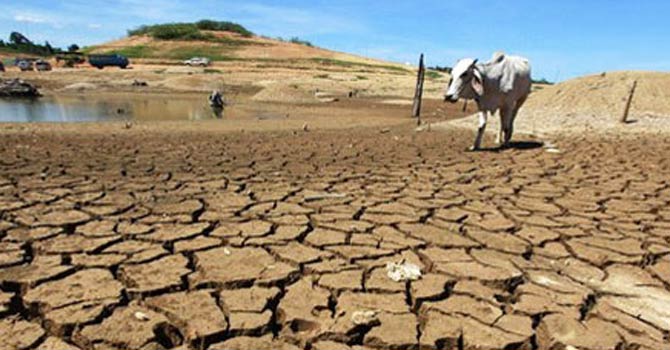KARACHI, May 30: Poor governance and lack of natural resources’ management have intensified the gravity of challenges posed by climate change as the vulnerable communities living along the country’s coastline are the most deprived in terms of basic needs such as water, education, health and economic wellbeing, said speakers at a programme organised by the World Wide Fund for Nature-Pakistan (WWF-P) in collaboration with its project partner LEAD Pakistan.
They stressed the need for an efficient institutional mechanism at the union council level to address problems being caused by climate variability.
The event held under a five-year project, ‘Building capacity on climate change adaptation in coastal areas of Pakistan’, was held to launch two studies — Socioeconomic baseline of Pakistan’s coastal areas and Negotiating known unknowns: ‘better’ climate adaptation practices from the Indian Ocean basin.
The studies, part of the project, funded by the European Commission, were conducted by the WWF-P.
Abject poverty
Sharing some salient features of the research on the socioeconomic baseline of coastal areas, Ali Dehlavi, the study’s co-author representing the WWF-P, informed the audience that the coastal areas of Kharo Chan and Keti Bunder located in Thatta district and Jiwani in Gwadar district had been selected for the research.
The communities in these coastal areas, he said, lived in abject poverty and were deprived of the most basic necessities of life.
“Of the three sites, Kharo Chan showed the highest incidence of poverty as measured by the national poverty line, with nearly 50pc of households earning Rs50 per day or less. More than 40pc and 20pc of our sampled households at Keti Bunder and Jiwani, respectively, fall below the poverty line,” he said.
Giving more details of the study’s results, he said illiteracy was the highest at Keti Bunder where 80pc of households reported not having schools at all; and it was the lowest at Jiwani where 14pc of households reported illiteracy. Vocational skills such as rally- and hat-making, embroidery and sewing were most diversified at Jiwani and least so in Kharo Chan. More exclusive fishers were found at Keti Bunder (68pc) than at Jiwani (53pc) or Kharo Chan (48pc).
Women, Mr Dehlavi said, had significant constraints that prevent them from contributing to monthly earnings, to fulfil their responsibilities as mothers since access to health facilities was limited.
Several and significant obstacles stood in the way of shifting out of poverty as indicated by livelihood indicators, he said while explaining that high dependency on natural resource was closely tied to vulnerability and that the significant margins claimed by middleman at all three sites suggested that fishers were unlikely to develop their businesses.
“Water supply is a primary priority at both Kharo Chan and Keti Bunder. Access to basic health units, having functional schools and employment are other pressing needs of residents living in coastal areas,” he said, noting that climate change adaptation strategies adopted by villagers were also found in place in some cases.
Food security
Speaking about climate change and food security in coastal areas of Balochistan, Dr Pervaiz Amir, a senior economist, said that out of 24 food insecure districts in the country, 10 were in Balochistan. The availability of food and ability to buy it, in his view, were two different things and the problem was worsening with rising food and electricity prices.
“Balochistan is in the red zone. A rise in temperature and sea level, changing weather patterns and declining water security put the province at a greater risk of having food insecurity, which was found to be at 52.2pc during the recent floods in the province,” Dr Amir said.
Suggesting a number of measures to tackle climate change issues, he said that Pakistan needed to broaden the food basket especially for staple crops that could grow under stressed environment, besides it should address water scarcity by utilising seawater through the reverse osmosis process and making use of alternative energy.
Dr Moazzam Ali Khan, director of the Institute of Environmental Studies, Karachi University, showed slides depicting the impact of climate change in Pakistan, and said that the phenomenon had hugely impacted every aspect of life. A political will and institutional mechanism was needed to address the issue, he said.
Syed Mujtaba Hussain, a deputy secretary in the ministry of climate change, made a presentation on the national climate change policy developed for this year. He said the provinces would take guidance from the national policy and would make their own strategies to attend to the climate change issues.
There was, however, concern among the audience over the government’s inaction. They observed that there was no ownership of the federal government’s policy decision at the provincial level.
Giving an insight into the five-year project, Naomi Alesworth Siddique said the project intended to reduce the risks faced by vulnerable communities in the coastal areas of Pakistan through the implementation of a variety of actions.
These measures, she said, included intervention related to adaptation and building capability among vulnerable coastal communities; in addition to promoting integrated water resource management and river basin management.
Farooq Ahmed Laghari, representing iMMAP Pakistan, Rab Nawaz and Dr Ejaz Ahmed also spoke.














































Dear visitor, the comments section is undergoing an overhaul and will return soon.